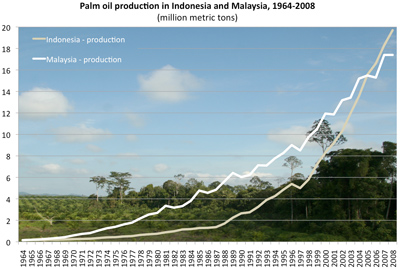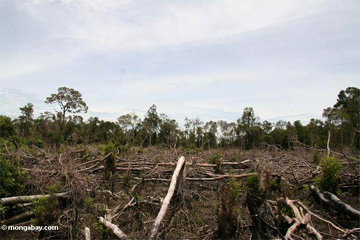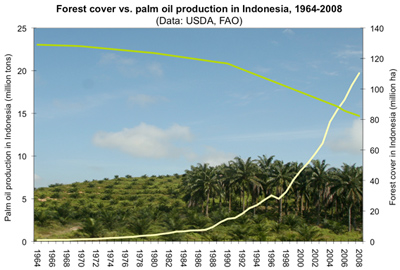|
|
LUSH Cosmetics, a leading cosmetics-maker, will no longer use palm oil due to environmental concerns over its production.
LUSH, which is now selling a palm oil-free soap, has launched a two-pronged campaign to make consumers aware of the impacts of palm cultivation on tropical forests and encourage other consumer-products companies, including Procter & Gamble, Unilever and Nestle, to reformulate their products using alternatives to palm oil.
“While the cosmetics industry uses approximately 6-7 percent of the global supply of palm oil, the biggest current usage is food, with one out of every ten items in the supermarket, from chips and breads to biscuits and margarine, containing this sinister ingredient,” said LUSH in a statement. Until now LUSH used about 60.5 metric tons of palm oil per year. The company has been developing palm oil-free soap base for three years.
 |
“We believe that until global levels of palm use are cut dramatically, there is little hope of a workable sustainable palm oil industry, and the future of the forests, animals and people of Indonesia and Malaysia is bleak,” said Brandi Halls, LUSH Communications Manager.
Accompanying the launch of the public awareness campaign, LUSH is selling a tree-shaped soap called “Jungle”, one hundred percent of the proceeds from which will be donated to the Rainforest Foundation, a group that campaigns for indigenous rights and rainforest conservation. LUSH is also partnering with the Rainforest Action Network (RAN), an activist group, to convince other companies to source their ingredients responsibly.
LUSH’s announcement comes less than a month after the Auckland Zoo pulled Cadbury chocolates from its shops and restaurants following the candy maker’s decision to start adding palm oil to its chocolates.
|
|
The bans on palm oil by LUSH and Auckland Zoo are a departure from a broader push to use responsibly-sourced palm oil. In recent years, Unilever, Whole Foods, and other companies have pledged to use only sources of palm oil that have been independently verified and certified to meet environmental and social sustainability criteria. But efforts to develop and promote eco-friendly palm oil have stumbled out of the blocks. Some activist groups have questioned the credibility of palm oil certified by the Roundtable on Sustainable Palm Oil (RSPO), an initiative lays out green standards for palm oil production. At the same time demand for certified palm oil, which costs more to produce than conventional palm oil and carries an 8-15 percent price premium, has been tepid, partly as a result of the global economic downturn.
Nevertheless curtailing global demand for palm oil will be a challenge for green groups. Oil palm is the world’s most productive oilseed, generating more vegetable oil at a lower cost than any other crop per unit of area. A single hectare of oil palm may yield nearly 6,000 liters of crude palm oil, outperforming soy, canola/rapeseed, and corn by ten- to twenty-fold. Further, the recent drop in palm oil prices have made it more attractive as a feedstock for biofuel production, opening an entire new market for the oilseed. And although Western governments are talking of banning palm oil-based biodiesel due to worries about emissions associated with its production on tropical forest lands, other countries, including China and India, are gearing up to burn more biodiesel as car ownership expands. Thus it seems likely that demand for palm oil will remain strong.
 Peat forest conversion in Kalimantan, Indonesian Borneo. |
Given this outlook, new efforts are focusing on encouraging oil palm cultivation on abandoned grasslands, rather than in place of tropical forests. A pair of papers published earlier this year in Conservation Letters suggested that palm oil developers could make more money preserving carbon-dense ecosystems for carbon payments than converting forests and peatlands for plantations. Already two major palm oil producers have agreed to turn over forest concessions in Borneo in exchange for carbon credits from forest conservation.
But in the face of large-scale destruction of forests across Indonesia and Malaysia for oil palm plantations, many environmentalists remain skeptical of the palm oil industry. With fires currently burning out-of-control in key palm oil-producing parts of Borneo and Sumatra, they have good reason to be suspicious.
Related articles
